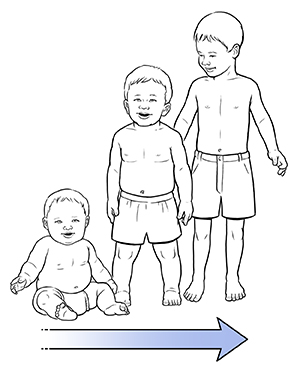When Your Child Is Eating Less
You may be concerned that your child is eating less than they used to. This is often a normal stage of development for a growing child. This sheet helps you understand normal changes in your child’s eating patterns.
Normal eating and growth
The rate at which children gain weight slows between the ages of 18 months and 3 years. This means that it’s perfectly normal for your chubby baby to thin down to a lean toddler. As long as your child is gaining weight at a normal rate over time, you don’t need to worry. Your child’s healthcare provider will likely chart your child’s height and weight. This will show if your child’s overall growth is normal.

When your child starts eating less
Normal signs that your child’s eating patterns are changing include:
-
Refusing to eat when given food
-
Refusing to eat food that they used to like
-
Eating smaller amounts at each meal
-
Eating fewer kinds of foods
-
Eating frequent small meals instead of several larger ones
-
Eating a lot one day and not much the next
-
Eating only one complete meal a day
What you can do
Parents and children have different parts to play when it comes to mealtimes. Learn your role. Then let your child do their part.
Your role is to:
-
Shop. Buy many kinds of healthy foods, including fruits and vegetables.
-
Prepare meals. Make healthy meals at home.
-
Serve food. Offer different kinds of healthy foods to your child at each meal.
-
Lead by example. Show your child how you would like them to eat by eating healthy foods yourself.
Your child’s role is to:
-
Decide what to eat. Let your child pick from at least 2 or 3 kinds of healthy foods at each meal.
-
Tell you when they are full. Your child may eat a lot at some meals, and not much at others. This is normal. The nutrition balances out over time.
-
Taste a small amount of new foods. Don’t expect your child to eat a lot of a new food at first, but you can ask them to taste it. Don't force the issue. Sooner or later, your child may start choosing this food for -themself.
Mealtime tips
Here are some tips to help you handle these changes:
-
Don’t battle over food. Offer your child choices and let them pick which foods to eat.
-
Offer good food choices. Keep healthy foods in the house at all times.
-
Make sure to sit down with your kids to eat during mealtimes.
-
Don’t let your child drink a glass of milk or other fluids instead of eating. For a child older than 1 year, milk is a beverage, not a meal.
-
Don’t let your child walk around with food. Set up a place for family meals.
-
Let your child eat only when hungry.
-
Don’t expect your child to eat a set amount of food every day. Look at your child’s eating patterns over weeks, not days.
-
Don’t assume you have to add vitamins to your child’s diet. If you are worried about your child’s vitamin intake, ask the healthcare provider if your child should take a daily multivitamin.
-
Be patient. Things may not always go as smoothly as you like. But your child will grow out of this phase soon enough.
-
Try not to make faces or comments about food you don't like. Children with parents who are picky eaters are more likely to become picky eaters themselves.
When to call your child's healthcare provider
Call your child's healthcare provider if your child:
-
Is eating nonfood items, such as paper, dirt, or chalk (a condition called pica)
-
Is often tired or pale
-
Has watery stools or diarrhea for more than 1 week
-
Has abnormal eating habits (such as eating only 1 kind of food at every meal)